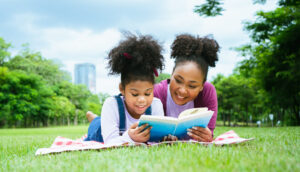 Summer is finally upon us and children are enjoying the relaxed days and nights. But there’s always a worry about what has been coined “summer slide.” According to a recent study, children between the third and fifth grades lose 20% of their school-year gains in reading and 27% in math during summer break.
Summer is finally upon us and children are enjoying the relaxed days and nights. But there’s always a worry about what has been coined “summer slide.” According to a recent study, children between the third and fifth grades lose 20% of their school-year gains in reading and 27% in math during summer break.
The good news is that there are fun, educational activities that can help prevent the slide. Here is a list of ideas that you and your family can incorporate into your lazy days of summer:
Create Your Own Reading Marathon
Visit your local public library and get your children involved with summer reading programs. These are a fun way to get children excited about reading and exploring libraries. Create a reading schedule for both you and your children and see how many books your family can read before school starts in the fall.
Make Grocery Shopping a Family Affair
Give your children the job of writing the grocery list each week. While at the store, encourage children to read the signs and find the item needed in each aisle. Weighing fruits and veggies can be fun and educational too. Guess the weight of each item, write it down in order of heaviest to lightest. Guessing how much the list of groceries will cost versus what they actually cost can add a fun competition to your shopping chore.
Cook and Bake Together
Following recipes that call for ingredients to be measured, counted or weighed can help refresh math skills. Another fun idea is cutting fruits and vegetables into specific sizes like 1/2 or 1/4 inch pieces. The kitchen is full of things to read, from recipes to boxes of cereal.
Go on Screen-free Excursions
Turn your devices off and head outside for daily walks or bike rides. This time can also be used for an outdoor scavenger hunt by creating a list of items that can be seen or collected while on the trails. This is a great way to get bodies and brains moving and enjoy the nature that surrounds us.
Get Out the Puzzles and Board Games
Games and puzzles are a great way for kids to brush up on the basics while having fun. Simple board games can provide counting and reading experiences in a fun and competitive way. Board games do not have to be bought; you can easily do an online search on how to make your own board games out of everyday objects in your home. Also, check out if there are games available at your local library. Puzzles are great for memory, concentration and improving problem solving skills. You can also make your own puzzles by cutting cereal boxes or patterned paper into shapes.
Summer is the perfect time for children to experience that learning doesn’t always have to happen in the classroom. Take some time to think outside the box and create unique ways to engage both children and you in activities that will help stop the summer slide! The effort you put into it now will pay off when your child starts school in the fall!